Powerful Women
-
Inspiring Witsies make their education count
Many alumnae were acknowledged during Women’s Month for their contributions as leaders. Here are some highlights of the stand-out profiles from news stories and interviews.
- Amanda Dambuza (BA 1999) is an entrepreneur, founder and CEO of Uyandiswa – a management consulting firm launched in 2013. She is also founder and director of Leadership Development Strategies which offers mentoring, coaching, talent management and team development. She has extensive experience working in IT and the financial services sector. She has a history as Chief Information Officer at Barclays Africa, and Financial Services Director of JSE listed Adapt IT. She was a guest speaker at World Economic Forum Cape Town in 2019. She serves on several boards and directorships.
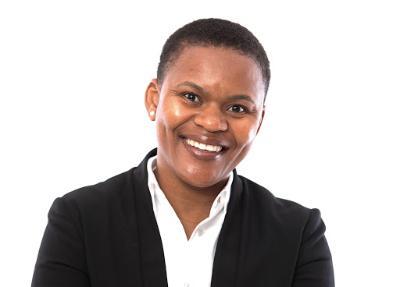
Her book Baked in Pain: Your Traumatic Past May Be Just the Fuel You Need to Soar details the obstacles she had to overcome. She recalls in an interview with Joanne Joseph on Radio 702, about her experience of registering at Wits. “The only money I had in my pocket was R5 to catch the two-hour train ride back to Orange Farm from Park Station. I remember sitting at the registration counter trying to get the lady just to listen to me. All I was hoping for was some kind of guidance. I didn’t know how to fill in a form or what I was going to study.”
She was turned away because she didn’t have the required R4 000 for registration. But undeterred she returned the next day. “Eventually someone listened and I was sent to the guidance office. It was the best thing. I got to talk to a psychologist.” From here she confronted the trauma of being abandoned by her parents and hurt by adults entrusted to look after her. “I wanted to prove to myself that I will not amount to nothing.”
Dambuza has just brought out another book A Brave Girl Named Aya, aimed at a younger audience to introduce difficult conversations around abuse and violence. She is passionate about personal mastery and instilling hope.
Read more from her profile in Glamour Magazine here - Tshepiso Mokoena (BSc 2012, HDipSc 2014, BSc Hons 2015, MSc 2020) is founder and director of Tshepiso Mokoena Foundation, which offers developmental support, services and healthcare to deaf people in South Africa. She is currently running the foundation from Washington DC, in the US, working as a sign language interpreter and hoping to take her commitment to help others global.
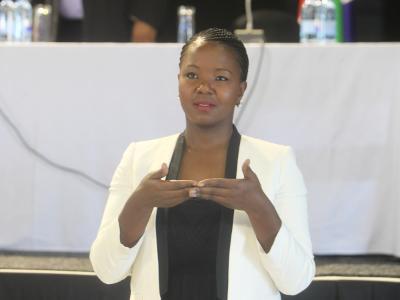 She was honoured at the L’Oreal Paris Women of Worth Awards in 2017. The organisation plans to partner the Deaf Girls Code initiative with iSchoolAfrica, so that it operates across Africa. She serves on the Board of Trustees of the Equal Health for Deaf People Organisation in Cape Town. She is current Vice President and Region 7 representative for Children of Deaf Adults and board member of Immense Grace Foundation in Lagos, Nigeria. She says in the Mail & Guardian’s Powerful Women supplement interview: “You must understand why you are doing what you are doing, because this will keep you grounded when challengers and obstacles come your way at any point in your journey. Don’t forget self-care.”
She was honoured at the L’Oreal Paris Women of Worth Awards in 2017. The organisation plans to partner the Deaf Girls Code initiative with iSchoolAfrica, so that it operates across Africa. She serves on the Board of Trustees of the Equal Health for Deaf People Organisation in Cape Town. She is current Vice President and Region 7 representative for Children of Deaf Adults and board member of Immense Grace Foundation in Lagos, Nigeria. She says in the Mail & Guardian’s Powerful Women supplement interview: “You must understand why you are doing what you are doing, because this will keep you grounded when challengers and obstacles come your way at any point in your journey. Don’t forget self-care.” - Faranaaz Veriava (BA 1991, LLB 1995) is an Advocate, Senior Researcher and Legal Counsel at SECTION27 where she is the Head of Education at the organisation she joined in 2014. She founded the Education Law Project at the Centre for Applied Legal Studies at Wits where she helped establish a project to conduct research, litigation and advocacy to realise the right to basic education for the poorest pupils.
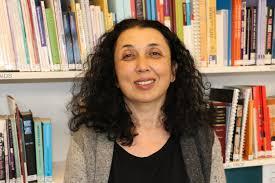 She was central to SECTION27’s legal challenge in July compelling the Department of Basic Education to continue its nutrition programme during the COVID-19 lockdown as well as fighting for justice for five-year-old Michael Komape, who drowned in a pit toilet at his Limpopo school in 2014. Veriava has worked as a lawyer at the South African Human Rights Commission and has practiced as an advocate of the Johannesburg Bar. In a recent interview with the Daily Maverick she speaks about challenges of today: “Identity politics of today, like Black Consciousness Movement, are critical to get over an inferiority complex, to recognise oppression but it has to move beyond this and it needs to overcome opportunistic exploitation.” She says it’s not a time to shrink from personal power, responsibility or action.
She was central to SECTION27’s legal challenge in July compelling the Department of Basic Education to continue its nutrition programme during the COVID-19 lockdown as well as fighting for justice for five-year-old Michael Komape, who drowned in a pit toilet at his Limpopo school in 2014. Veriava has worked as a lawyer at the South African Human Rights Commission and has practiced as an advocate of the Johannesburg Bar. In a recent interview with the Daily Maverick she speaks about challenges of today: “Identity politics of today, like Black Consciousness Movement, are critical to get over an inferiority complex, to recognise oppression but it has to move beyond this and it needs to overcome opportunistic exploitation.” She says it’s not a time to shrink from personal power, responsibility or action. -
Professor Feroza Motara (BA 1986, MBBCh 1991, MMed 2013), a Professor of Emergency Medicine at Wits and Head of the Emergency Department at Charlotte Maxeke Hospital, had to overcome many hurdles. She is the eldest of six children though her chances of earning a tertiary education were slim. She was awarded a bursary as one out of the 50 (out of about 2000 applicants) who won a scholarship to study a BA at Wits. She was later accepted to study medicine. “My proudest moment was graduating in medicine and becoming a professor.”
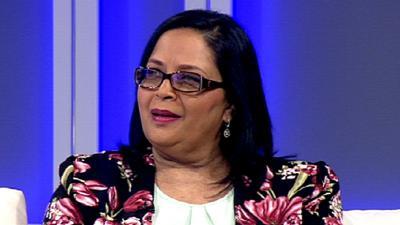
She recalls, in an interview with Netcare, a time in the early 1990s when women studying medicine only made up about 30% of the class, and non-whites were only 30 in a class of 230. “I remember being called ‘nursie’ by an elderly gentleman when I was an intern in 1991 – the misconception that females can’t be specialists and head of departments is largely a thing of the past.”
She has been in charge of one of the country’s busiest emergency departments during the COVID-19 pandemic and still finds words of encouragement for others. “You are the maker of your destiny. Despite the hurdles in your way, you can do whatever you want to – it may take you longer than you anticipated, but you can still do it with hard work and dedication.”
- Linah Maphanga (BSc 2014, BSc Hon 2015) is the founder and CEO of Famers Assistant, an agri-tech business that connects small-holder farmers to landowners, equipment, investors and funding institutions through a web platform. She is the recipient of a Leaders in Innovation award and the Indalo Yethu Trust award in 2019 and was also selected to go to the Royal Academy of Engineering. Maphanga was born and grew up in Hazyview, Mpumalanga where her parents are livestock and crop farmers, with no formal education. Maphanga started out as the family accountant and came up with business plans while in high school.
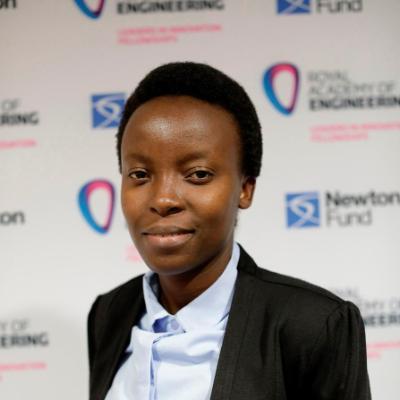 “I grew up on a farm and growing up there I would always see my parents struggling with market access and expanding their farm. So, I would help them during June holidays. Sometimes helping them meant I had to go and sell the produce to the community and then that is when I learnt how the market works,” she tells Food for Mzansi.
“I grew up on a farm and growing up there I would always see my parents struggling with market access and expanding their farm. So, I would help them during June holidays. Sometimes helping them meant I had to go and sell the produce to the community and then that is when I learnt how the market works,” she tells Food for Mzansi.
She obtained her bachelor’s degree in 2014 and an honours degree in geophysics a year later. She joined the mining sector where she worked for two years. In 2018 she joined the Farmers Network South Africa and assisted with the South African Farmers Development Association’s website, providing farmers with information. Her business started from a Facebook page with 200 followers to assist farmers, growing into her current business helping more than 10 000 clients.
She says her mom is her biggest inspiration: “I always tell people that my mother is the greatest scientist ever, although she never went to school. That woman knows everything about plant production, although she never studied plant production. She will just look at the tree and tell you it has a problem.”
- Professor Glenda Gray (MBBCh 1986), the first female President and CEO of the South African Medical Research Council and the Chair of the Research Committee on COVID-19, shares in a personal interview on Classic FM about growing up on the East Rand, into a large, poor family.
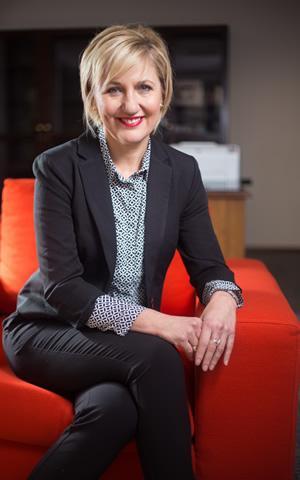 “From a young age, we were told that education was important and the only way we could get out of poverty was to study and go to university. I loved books. I read books all the time. I spent my holidays at home reading book after book. A book a day in my pyjamas.” She mentions the time she remembers when she wanted to be a doctor. “I was swinging on a gate watching a vet deliver a breached cow. He looked up and asked: ‘are you going to be a vet one day?’ And I said no I want to look after real babies and become a doctor. It was an innate feeling I had as little girl.”
“From a young age, we were told that education was important and the only way we could get out of poverty was to study and go to university. I loved books. I read books all the time. I spent my holidays at home reading book after book. A book a day in my pyjamas.” She mentions the time she remembers when she wanted to be a doctor. “I was swinging on a gate watching a vet deliver a breached cow. He looked up and asked: ‘are you going to be a vet one day?’ And I said no I want to look after real babies and become a doctor. It was an innate feeling I had as little girl.”
She says finding her voice was one of the biggest things she had to overcome, and not to be intimidated by class and gender. “Coming from Boksburg, we don’t speak the right English. When I went to university it took me a long time to achieve because I came from a school with no maths teachers. The important thing is that, it doesn’t matter where you come from and how you feel when you first start studying – eventually you’ll catch up.”
She says her two daughters are her biggest source of inspiration. “They are my moral compass and I have to practice what I preach. If I teach them to be fearless, I have to be fearless.”
Explore more inspirational Wits alumnae interviews here:
- Ginelle Makhado (BCom 2008, 2009) is a consultant in Consumer Support Systems at MTN Group, profiled in Brainstorm Magazine for background in IT.
- Tanya Stevens, Professional Associate at GIBS, co-authors article on complex, adaptive leadership.
- Moipone Nana Magomola (LLB 1992) is Chairperson of GIBB Holdings Pty Ltd. She is a leading businesswoman who has served across varied industries. She believes that diversity breeds innovation. In 1999 she was a trustee of the Nelson Mandela Children’s fund and later deputy chair of Nelson Mandela Children’s fund Hospital Trust. She co-founded the Business Women’s Association, and the International Women’s Forum, she serves as its global director. She was honoured in 2012 by the IWF as recipient of “Women Who Make a Difference” award.
- Thuli Madonsela (LLB 1991, LLD honoris causa 2017) is interviewed by Carolyn Steyn on ClassicFM. As well as featured in Facebook Africa’s #ChangeMakers
- Adovocate Brenda Madumise-Pajibo (LLB 1995) talks about expectation of women, her role as gender activist.
- Kwena Mabotja (PDM 2011) is regional director for the SAP Purpose Network, profiled in Brainstorm Magazine.
- Affiong Williams (BSc, PDM 2008) CEO and Founder of Reelfruit, a topmost fruit processing, packaging and marketing company in Nigeria, shares her journey.
- Phumelele Makatini (MM 2016) is profiled as CEO of the Building Construction Industry Medical Fund.
- Linda Mateza (MM 2012) CEO and Principal Officer of Eskom Pension and Provident Fund is profiled on the challenges that lie ahead.
- Silondiwe Magwaza (BSc Cons 2020) profiled as woman in construction.
- Katherine Otten (BArch 1987) featured as a leader in architecture.
- Dr Spo Kgalamono (DOH 2001, MM 2010, DPH 2013) expert in occupational medicine and acting Executive Director for the National Institute for Occupational Health; Dr Tanusha Singh (BSc 1997, BSc Hons 1998, MM 2002, PhD 2010) is the Head of the Immunology and Microbiology at National Institute of Occupational Health, Nisha Naicker (MBBCh 1994, MM 2006, PhD 2012) Head of Epidemiology and Surveillance; were profiled on their roles during COVID-19 pandemic.
- Tsitsi Marote (BSc 2018, BSc Hons 2019) was profiled for groundbreaking work as co-owner of healthcare app called Guardian Health and as data scientist at teraflow.ai.
- Apiwe Nxusani (BSc 2006) a master brewer was profiled in StartUp Africa.
- Fatima Vawda (BSc 1993, BSc Hon 1994, MSc 1995, HdipCompSc 1997) profiled in Money Marketing.


